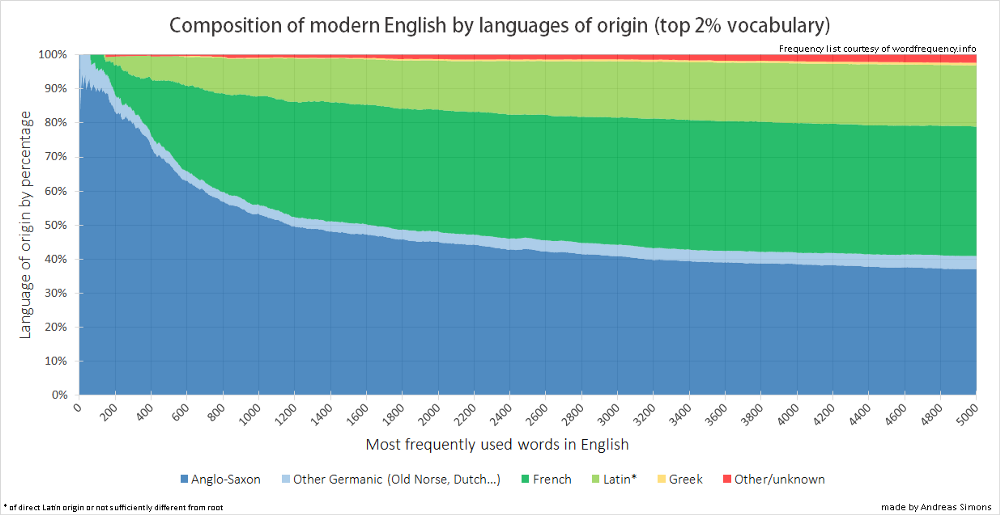What percentage of current English words are of native Anglo-Saxon origin? I have seen stats about how large percentages of the English words currently in use come from French, Latin, or German origins, but I want to know how many truly native words the English language has left.
-
4Seems a little odd to call Anglo-Saxon (or Old English) "native" since it replaced the Celtic languages spoken by the "native" inhabitants of Briton (who themselves only arrived there in the 6th century BCE). Even Latin speakers had been in Briton for a few hundred years before the Anglo-Saxons took over. And thus, Old English itself contains loans from Latin, a few from Celtic, and some from Old Norse. On top of that, the Angles and Saxons had already borrowed Latin words before leaving continental Europe. The point is, how would you define an authentically Anglo-Saxon word?– JuhaszCommented Apr 7, 2020 at 18:55
-
I guess I'm just asking how many English words currently in use come from Old English. I tried doing the math myself. The best I could find was Wikipedia's list of Anglo-Saxon rooted words, which had a total of about 4,000 entries. Most sources estimate English to have about 170,000. So I did 4,000/170,000 and that came out to about 2.4%. Now that doesn't seem quite right to me, so I'm thinking Wikipedia's list does not include all such words, but I have no way of checking at the moment. If anyone could point me to a source where I can verify this, that would be much appreciated.– EmaJCommented Apr 7, 2020 at 20:52
-
@Juhasz Then (or rather previously), ther'e Beakerspeak.– Edwin AshworthCommented Apr 8, 2020 at 14:12
-
@EdwinAshworth, yes that was truley the Bell Epoque of English culture. (Sorry, that was terrible).– JuhaszCommented Apr 8, 2020 at 15:59
-
@Juhasz I bet they didn't make nearly as many types as us civilised typos.– Edwin AshworthCommented Apr 8, 2020 at 18:26
3 Answers
I can't find a duplicate.
This Wikipedia article gives:
Estimates of native words (derived from Old English) range from 20%–33%, with the rest made up of outside borrowings.
References are given at the end of the article, but it is not mentioned which ones contain surveys arriving at these estimates.
-
2Percentages vary a lot with style and context. Scientific literature is very high in Latinate and Greek "intestinal" terms, with fewer "gutsy" Germanic words. And speech is very different from writing here, so, as with any analysis, one can't say much without specifying precisely what area one is counting, and how the count is conducted. When I was teaching freshman etymology, I used to tell students to pick a paragraph they particularly liked and look up the roots of every word in it. It's not a hard thing to do if you have a dictionary. Commented Apr 7, 2020 at 20:11
-
Trying to decide whether this is an attempt to use more "intestinal" words or not Commented Aug 8 at 0:47
-
There are lots of ways to count words - are derived words separate (freedom from free); what about plurals, verb forms etc; are you counting by frequency of use; what about archaic, slang, dialect; what texts or speech are you using, or if using a dictionary, what dictionary; etc?– Stuart FCommented Aug 8 at 8:52
-
I'd think that the surveyors took these variables into account in working up their results. 20%-33% is hardly precise (33% of N being 65% higher than 20% of N). Commented Aug 8 at 15:03
While I don't entirely trust the methodology, I did find an article which attempts to address this based on the most commonly used words. In "The English language is a lot more French than we thought, here’s why", Andreas Simons got a list of the 5,000 most common English words (which will be about "85% of all words in any English source") and scraped etymology sites (mostly Etymonline) to see what languages were mentioned in the first few words of each word's etymology:

I'm not sure what happened to more recently coined native words; perhaps they don't occur often enough within the top 5000 words to have their own category.
As for an approach without accounting for frequency, OED search returns 3,218 non-obsolete entries of English origin that were attested before the year 1200. (Note that many words have multiple origins, or uncertain origins. "Student" turns up in searches for later words of "English" origin, because it might come from the now-obsolete English word estudiant, in addition to its Latin and French influences.) OED has 519,834 entries total.
See also my answer to Where are all the Latin words?
I think it doesn’t make any sense to consider the ENTIRE English dictionary, take the germanic or latin words and do fractions. In a dictionary of maybe 20000 words you’ll maybe end up using 5000, the other words you never heard. There’s a lot of words that maybe not even doctors or politicians know, and yet they’re present in the dictionary. And those rare words are usually latinate sources. So one might ask: “do i need to count them?”. My answer is simply “no”. And plus it’s even possible sometimes to replace latin words with germanic equivalents with relative ease. And when you take away the never-used latin/greek words you’ll notice how the germnanic identity of English becomes more apparent.
